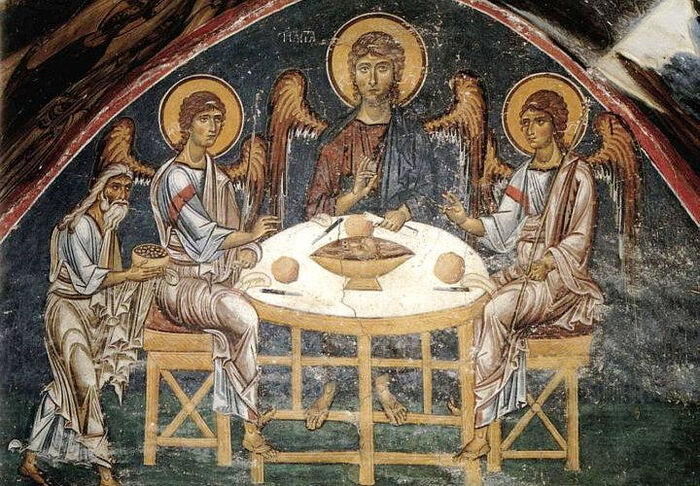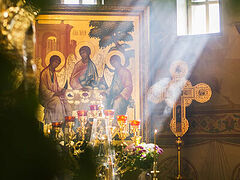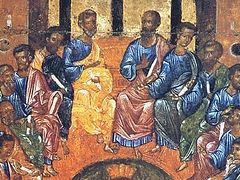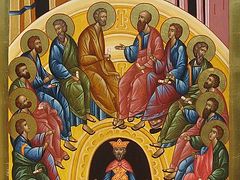 Late twelfth-century icon of the Hospitality of Abraham. Photo: sunlight.net
Late twelfth-century icon of the Hospitality of Abraham. Photo: sunlight.net
“In the name of the Father, and of the Son, and of the Holy Spirit!”
It is with these great and holy words that the pastors of the Church usually begin all of their talks with us, my brethren. On other days, these holy words serve only as the holy heading to the Church’s words and conversations; but on this day, they can form the very subject of our teaching. For we now celebrate for the honor and glory of the All Holy, Consubstantial, Life-Creating, and Undivided Trinity: What is more appropriate to talk about now, if not about those Persons in Whose honor this celebration is being held?
True, it’s difficult to look at the sun. It’s even more difficult to behold the Most Holy and Heavenly Trinity. There, vision is lost, here, the mind goes blind! So blinded were Arius, Macedonius, Sabellius, and Nestorius! And even now, those who dare to look directly at the most luminous face of the creative Being with their own eyes go blind. Let us proceed in such a way, but imitating the example of the God-wise and ecumenical teachers, let us arm our weak eyesight with a monocular, which while bringing the spiritual sun closer, at the same time moderates for us the brilliance of its rays. This monocular is the word of God, uttered by the Prophets and Apostles. This is the most reliable means for our purpose, for in the word of God either the Father Himself, or the Son Himself, or the Holy Spirit speaks about Himself. Don’t They know Themselves correctly, or aren’t They able to speak about Themselves as They should?
What does the word of God reveal to us about God? It reveals that God is one in all the power of His word; that, however, this God Who is one in essence consists of Three Persons. For the One Who appeared as one on Sinai and declared through Moses: Hear, O Israel: The LORD our God is one Lord (Deut. 6:4), the same was revealed in the Jordan in three forms, and through His Evangelist proclaimed: For there are three that bear record in Heaven, the Father, the Word, and the Holy Spirit: and these Three are One (1 Jn. 5:7). And the Son of God Himself, Who confessed Him Whom no man hath seen at any time (Jn. 1:18), sending the Apostles to turn the entire world from darkness to light, commanded them to baptize all peoples in the name of the Father, and of the Son, and of the Holy Spirit. After this, it’s by no means an indifferent act for us to confess the One, or the Triune God: No, to confess, worship, and preach the Most Holy Trinity is our immutable duty, because this is the foundation of our faith, the object of our love, and the pledge of our hope. This is eternal life! For who will redeem us with his own blood if not God the Son? Who will sanctify us by his grace if not God the Holy Spirit?
Therefore, in the one God, we confess Three—God the Father, God the Son, and God the Holy Spirit. God the Father is named such because He, being the beginning of the entire Godhead, pre-eternally begat the Son and pre-eternally produced from Himself the Most Holy Spirit. God the Son is so named because He is begotten from all eternity by the Father, from His own Essence; and in time, He was well pleased to be born of the Most Holy Virgin Mary as man. God the Holy Spirit is so named because He is eternally spirated by the Father and Himself animates all things, especially spirits and rational souls.
How the Persons of the Godhead differ between Themselves is already evident from their very names. God the Father, according to the teaching of Holy Scripture, serves as the source of the Son and the Spirit, Himself unoriginate and self-existent; God the Son is begotten, but doesn’t beget and doesn’t send forth the Spirit; God the Holy Spirit proceeds from the Father, but isn’t begotten, nor does He Himself beget or send forth. Fatherhood, sonship, and procession—these are the three distinguishing characteristics of the Divine Persons! Thus differing from one another, these three Persons constitute one and the same God: The Father is God, the Son is God, and the Holy Spirit is God—not three Gods, but one Godhead. They are one in power, one in will, one in might, one in glory and authority.
Thus, following the word of God, the holy Church teaches about God without assuming that everything possible was said about God, or that what is said fully and perfectly expresses the image of the Divine Being.
No, despite its dignity as the Bride of Christ, the Church is far from such boldness. It calls the doctrine of the Holy Trinity a mystery; that is, a matter of faith that exceeds our minds; and what exceeds the mind cannot be expounded upon. What is expounded upon is no longer a mystery.
What’s most generally understood in this mystery of faith under consideration here is the benefaction with which each Person of the Most Holy Trinity has marked Himself in relation to man. From this point of view, there’s nothing unclear, no confusion. God the Father is our greatest Benefactor, inasmuch as He called us out of nothingness, honored us with His image, didn’t abandon us when we fell, but sent His Only-Begotten Son to redeem us and the Most Holy Spirit to sanctify us. God the Son is our greatest Benefactor inasmuch as during our ill-fated transgression of the Edenic commandment, He took upon Himself all responsibility for our sin and all the weight of our fall; and then in order to restore us to our primitive perfection, He clothed Himself with our nature, lived among us, died for us, and resurrected for us. God the Holy Spirit is our greatest benefactor inasmuch as despite His unparalleled holiness, He didn’t disdain us, sinful and unclean, but overshadows the Church with His grace, so that everything in it might beget, strengthen, and heal by the Sacraments us who are dead in our sins. He enlightens us through the Prophets and Apostles inspired by Him, and even deigns to mystically inhabit every believer’s soul, to prepare it for the eternal dwelling of the entirety of the Most Holy Trinity. In short, the whole teaching of the word of God about the actions of God the Father, God the Son, and God the Holy Spirit consists in the narrative about Their benefactions to sinful mankind in various forms.
And how many times has the myopic human mind with its pitiful bewilderments and objections risen up against this most exalted, comforting, and all-enlightening teaching! And this mind, insolent and audacious, would like the fullness of the Godhead to be revealed to it!... Behold, the edge of the veil is lifted up, revealing a hint of the unity of the Tri-Hypostatic God, and the poor mind is unable to bear the radiance! What would have happened had the Triune God appeared to it in all the fullness of Its mysterious perfections? But if it’s hard for the mind to raise its eyes to Heaven and behold the Uncreated Light at its very source, then let the poor and weak at least look around themselves. For it wasn’t in vain that another wise pagan noticed and said that a tri-unity shines throughout the world.
In fact, whether we consider the greatest or the least of the forces of nature, in every one of them we will see a threeness: Their very dimensions are threefold. Thus, all things are primarily enclosed in time and space, and time is threefold: past, present, and future. Space is also threefold: length, width, and height or depth. What keeps the whole world going? Centrifugal, centripetal, and rotational forces. What does a day consist of? The morning, afternoon, and evening. What does every night consist of? Dusk, midnight, and dawn. What do we see in all things? Shape, color, and weight. With all of these and many others factors, all of visible nature expresses the threeness of the force that drew it out of nothingness.
But apart from all this, each of the Three Persons of the Godhead, we can say, has placed a kind of mark of His Personal existence on all things. For the difference between the Divine Persons, as we have said, is fatherhood, sonship, and the procession of the Spirit. Now look, which of the creatures that we see does not have the ability to give birth and be born? Which, despite its crudeness, doesn’t even have its own spirit? Everywhere there’s birth, everywhere there’s a spirit, as the traces and signs of the Tri-Hypostatic God.
But if the Divine Trinity shines throughout the entire world, then in man, created according to the image of God, It’s reflected with greater fullness. There’s a threeness everywhere and in everything here, beginning with the composition of our nature: our body with the ability to beget, our soul with the ability to feel and suffer, and our spirit with the ability to breathe in the higher, the Divine, and to animate the lower, the sensual, so it becomes not earthly and limited, but like the Heavenly, consubstantial and undivided Trinity, in Which Three are One! (1 Jn. 5:7).
Let’s take the human body, with its visible three-part composition: bones, flesh, and fluids. Let’s take the soul. It’s also in three parts: intellective, incensive, and appetitive. If we take the spirit, again there’re three: mind, will, and freedom. Each of these faculties is also threefold in action: The mind receives an impression from an object, judges, and concludes; freedom sees, chooses, and determines; the will is stimulated to desire, strives, and achieves. Amidst such Threeness in all things created, whether material or spiritual—would not contradicting the threeness in the uncreated be like closing your eyes and not even seeing the light at midday? Such is the fate of those who reject the guidance of the word of God and give themselves over to the guidance of their poor mind! Passing from delusion to delusion, they often reach the point where they begin to doubt their own existence.
Regretting such folly, and prayerfully seeking enlightenment from above for the deluded, let us turn, my brethren, to the subject of our talk; let us mentally ascend above all things created and draw near to the throne of the Tri-Hypostatic God, having received the boldness to do so through the merits of our Divine Redeemer. Let us fall down in awe before the greatness of the inscrutable perfections and, as a testimony of our love and gratitude for the Most Holy Trinity’s innumerable benefactions to us, let us offer our entire being to It. Let us offer our body to God the Father, that it might be an instrument for the fulfillment of His most holy will; let us offer our soul to God the Son, that it might be inspired by the power of His Cross; let us offer our spirit to God the Holy Spirit, that aflame from its dew-bearing breath, it might soar aloft over all things terrestrial. Blessings to those who even in this life begin, as our holy Church sings, to be “illumined by the Holy Trinity in a sacred mystery.”1
1 Matins, 1st Antiphon, Tone 4



